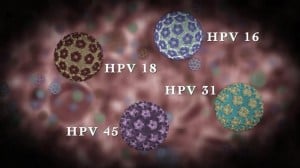What is Human Papilloma Virus (HPV) vaccine? Generally, vaccines are treatments that can prevent infections. Vaccines work by preparing our body to fight germs that cause a certain infection. The process of giving a vaccine is known as vaccination or immunisation. There are many vaccines designated for different types of germs and infections worldwide. The HPV vaccine helps to keep people from getting infected with a germ called “human papillomavirus” or “HPV”. There are 2 types of HPV vaccines available, namely “Gardasil” and “Cervarix”. Both are effective in prevention of HPV infection. Females can be given either of the two vaccines. Males are only allowed “Gardasil” because it gives them a wider protection. Both are given by injection and require total of 3 doses, scheduled to be completed within a period of 6 months. What does HPV infection leads to? HPV is a germ that is spread by skin and mucous membrane contact, including normal sexual intercourse, oral sex, anal sex or any other contact involving the genital area. An HPV infection in the genitals can cause cervical cancer in women. Besides, it can also cause genital warts in women and men. Moreover, HPV infection in the mouth and throat can lead to cancer of the mouth and throat in both sexes. Many types of HPV have being identified, however only 4 types are of greater concern. They are HPV 6, 11, 16 and 18 respectively. HPV 6 and 11 can cause genital warts while HPV 16 and 18 can cause cervical cancer.  Who should take HPV vaccine? HPV vaccination with either vaccine is recommended for all girls and women who are between ages 9 and 26 years. Vaccination with Gardasil is recommended for boys and men who are between 9 and 26 years. Both vaccines offer greatest protection from HPV if one is vaccinated before becoming sexually active. Nevertheless, one can still obtain some benefit from the vaccine as it would give protection from virus types that may not have affected the individual yet. What protection does this HPV vaccine offer? HPV vaccination is important because it can prevent cancer of cervix and genital warts. Other less common cancers include cancers of anus, penis, vagina, mouth and the throat. What is the policy of HPV vaccination in Malaysia? Do we need to pay for it? In Malaysia, the government is providing free HPV vaccination to Form 1 students irrespective of age. Those who are 18 years old and above are also eligible up to age 26 years to get free HPV vaccination at any of the government clinics around Malaysia according to the National Population and Family Development Board of Malaysia. For those who have passed those stages, HPV vaccine costs approximately RM300 per dose in hospitals and clinics. Remember, prevention is better than cure. A cost of RM300 in preventing cervical cancer is far more worthy than you can imagine. Is the HPV vaccine safe? HPV vaccine is halal. The vaccine is generally safe. Possible minor side effects include redness (rashes), fever, painful arms, hands, legs or feet and feeling sick (nausea). To understand more regarding the safety of various HPV vaccines, it is best to consult a doctor before you get your HPV vaccination. Does pap smear screening required after HPV vaccination? Yes, women who are vaccinated against HPV still need to have regular PAP smear to screen for cervical cancer. What are the recommended doses? An individual requires 3 shots over 6 months. For Cervarix, 1st dose, followed by 2nd dose and 3rd dose one and six months later. For Gardasil, 1st dose, followed by 2nd dose and 3rd dose two and six months later. How long does one being protected? On-going clinical trials show that it provides protection for up to 5 years. Further longitudinal follow up of vaccinated individuals may give us an idea of longer protection in the future. Booster dose not required. Prepared by: Prof Ariyananda, Department of Internal Medicine, Clinical School Seremban, International Medical University Fong Chung Yang, Ng Chun, Tan Weei Jier, Semester 9 Students, International Medical University Inthirah Narayanan, Deanery, Clinical School Seremban, International Medical University Dr Nagandla Kavitha, Senior Lecturer, Dept of Obstetrics and Gynaecology, Clinical School Seremban, International Medical University
Who should take HPV vaccine? HPV vaccination with either vaccine is recommended for all girls and women who are between ages 9 and 26 years. Vaccination with Gardasil is recommended for boys and men who are between 9 and 26 years. Both vaccines offer greatest protection from HPV if one is vaccinated before becoming sexually active. Nevertheless, one can still obtain some benefit from the vaccine as it would give protection from virus types that may not have affected the individual yet. What protection does this HPV vaccine offer? HPV vaccination is important because it can prevent cancer of cervix and genital warts. Other less common cancers include cancers of anus, penis, vagina, mouth and the throat. What is the policy of HPV vaccination in Malaysia? Do we need to pay for it? In Malaysia, the government is providing free HPV vaccination to Form 1 students irrespective of age. Those who are 18 years old and above are also eligible up to age 26 years to get free HPV vaccination at any of the government clinics around Malaysia according to the National Population and Family Development Board of Malaysia. For those who have passed those stages, HPV vaccine costs approximately RM300 per dose in hospitals and clinics. Remember, prevention is better than cure. A cost of RM300 in preventing cervical cancer is far more worthy than you can imagine. Is the HPV vaccine safe? HPV vaccine is halal. The vaccine is generally safe. Possible minor side effects include redness (rashes), fever, painful arms, hands, legs or feet and feeling sick (nausea). To understand more regarding the safety of various HPV vaccines, it is best to consult a doctor before you get your HPV vaccination. Does pap smear screening required after HPV vaccination? Yes, women who are vaccinated against HPV still need to have regular PAP smear to screen for cervical cancer. What are the recommended doses? An individual requires 3 shots over 6 months. For Cervarix, 1st dose, followed by 2nd dose and 3rd dose one and six months later. For Gardasil, 1st dose, followed by 2nd dose and 3rd dose two and six months later. How long does one being protected? On-going clinical trials show that it provides protection for up to 5 years. Further longitudinal follow up of vaccinated individuals may give us an idea of longer protection in the future. Booster dose not required. Prepared by: Prof Ariyananda, Department of Internal Medicine, Clinical School Seremban, International Medical University Fong Chung Yang, Ng Chun, Tan Weei Jier, Semester 9 Students, International Medical University Inthirah Narayanan, Deanery, Clinical School Seremban, International Medical University Dr Nagandla Kavitha, Senior Lecturer, Dept of Obstetrics and Gynaecology, Clinical School Seremban, International Medical University









